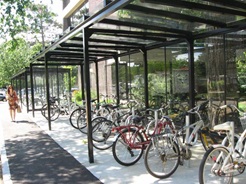Bicycle Parking Zoning Modifications

The City of Cambridge, through its Zoning Ordinance, has required bicycle parking as part of new development since 1981. These requirements, along with other improvements and investments made by the City, have helped to support bicycling as a preferred transportation option in Cambridge.
Bicycling in Cambridge has increased dramatically, approximately tripling in the past decade alone. While this has resulted in many environmental, economic and health benefits to the Cambridge community, it has also resulted in higher demand for bicycle parking. The bicycle parking requirements had not changed substantially in over 30 years, and the regulations were not consistent with modern standards in Cambridge or nationwide.
CDD, working with the Traffic, Parking and Transportation Department, the Bicycle Committee and the Planning Board, developed a revised set of bicycle parking zoning requirements. These requirements were adopted into the Zoning Ordinance by the City Council on June 3, 2013.
This project has been completed. No further updates to this project page will be made.